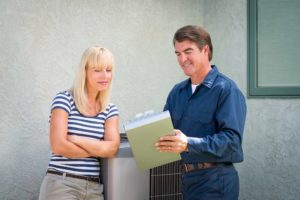5 Symptoms of Diminished IAQ in Charleston, SC
Your Charleston, SC home should be a comfortable and safe place to live; however, invisible dangers may be floating in the air. Because poor indoor air quality (IAQ) can lead to serious health issues, you want to watch out for signs that suggest this is an issue. Below are five signs that will alert you that your indoor air quality is diminishing.
1. Persistent Allergy Symptoms
If you suffer from seasonal allergies, you might, to some extent, have reconciled yourself with the need to simply endure the symptoms from time to time. This shouldn’t really be the case on a constant basis when you’re at home, however.
Many allergy-causing pollutants can imperceptibly find their way into your home from outside, but if your HVAC system functions well and maintains good airflow, it should push these things back outdoors before too long. If this doesn’t happen, your system may have clogged filters or may simply be breaking down.
Similarly, if you have pets, it’s prudent to have an air purification system at home that will remove pet hair and dander from your environment. With all this protection in place, your allergies should remain fairly dormant while you’re home. But if you’re still coughing or sneezing significantly without letup and medications do not seem to help, it’s time to check your indoor air quality.
2. Cold Symptoms
This is one of the less obvious signs of low IAQ and therefore deserves special attention. Low IAQ can sometimes trigger cold symptoms. Despite all appearances, though, you won’t actually have a cold in this situation.
So, how can you tell the difference between the consequences of being sick and merely breathing in bad air? After all, the simplest explanation for why you have cold symptoms is that you really do have a cold.
We recommend paying close attention to what happens to you after you leave your home. Do your cold symptoms mysteriously vanish after a while away from home? If so, then you might be looking at a problem rooted in poor IAQ.
3. Overall Feelings of Malaise
Low IAQ can adversely affect cognitive function and create general feelings of listlessness. It’s not easy to trace these problems to low IAQ, however, because nearly all people experience fatigue from time to time, and one can feel dizzy for reasons that are completely unrelated to the air that one is breathing. Again, to be sure that poor IAQ is what’s really causing these issues, pay attention to these symptoms when you leave home.
4. Hot and Cold Spots in Your Home
This is a more objective sign. If you notice that temperatures in your home are uneven, with some rooms inexplicably hotter or colder than others, then it’s a safe bet that your HVAC system isn’t functioning properly. It’s also likely that your home doesn’t have proper air circulation, which means that your IAQ is probably lackluster at best.
This problem warrants calling over an HVAC contractor and asking for repairs. If the underlying issues with the system are severe enough, you may need to replace it outright. Doing either of these will probably lead to an increase in IAQ.
5. Serious Health Conditions
Thankfully, this will only happen if you’ve endured exposure to quite high concentrations of airborne pollutants for an extended period — probably for many years. For that reason, it’s hoped that you’ll be able to diagnose and improve your IAQ issues before reaching this stage.
In saying this, we are referring to conditions, such as emphysema or COPD. The possibility of eventually developing these diseases after enough exposure to low IAQ should highly motivate you to get professional help to improve your air quality.
It’s crucial to maintain high-quality IAQ in your Charleston, SC home, as failure to do so can have countless adverse consequences. For help, call M & B Heating and Air today and ask for our indoor air quality services.
Image provided by iStock
You May Also Like

Why Does My Heat Pump Blow Cold Air in Charleston, SC?
When the temperatures dip outside in Charleston, South Carolina, you depend on your heating system to keep things warm indoors. If your… Continue Reading Why Does My Heat Pump Blow Cold Air in Charleston, SC?…

Signs That You May Need a New Furnace
There comes a time in a furnace lifespan when replacing it with a new heating system is the right move to make.… Continue Reading Signs That You May Need a New Furnace…

Why Does My Charleston, SC Circuit Breaker Trip When the Heat Pump Turns On?
A heat pump keeps you warm when the winter temperatures in Charleston, SC drop. However, problems with your heat pump can cause… Continue Reading Why Does My Charleston, SC Circuit Breaker Trip When the Heat Pump Turns On?…
